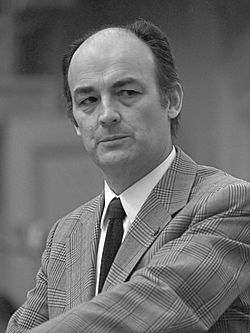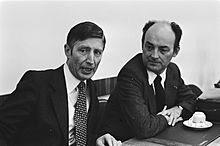Willem Aantjes facts for kids
Quick facts for kids
Willem Aantjes
|
|
|---|---|

Willem Aantjes in 1974
|
|
| Leader of the Anti-Revolutionary Party |
|
| In office 7 March 1973 – 25 May 1977 |
|
| Preceded by | Barend Biesheuvel |
| Succeeded by | Office discontinued |
| Parliamentary leader in the House of Representatives |
|
| In office 19 December 1977 – 7 November 1978 |
|
| Preceded by | Dries van Agt |
| Succeeded by | Ruud Lubbers |
| Parliamentary group | Christian Democratic Appeal |
| In office 7 March 1973 – 8 June 1977 |
|
| Preceded by | Barend Biesheuvel |
| Succeeded by | Office discontinued |
| In office 6 July 1971 – 7 December 1972 |
|
| Preceded by | Barend Biesheuvel |
| Succeeded by | Barend Biesheuvel |
| Parliamentary group | Anti-Revolutionary Party |
| Deputy Leader of the Anti-Revolutionary Party |
|
| In office 23 February 1967 – 7 March 1973 |
|
| Leader | Barend Biesheuvel |
| Preceded by | Bauke Roolvink |
| Succeeded by | Gerrit van Dam |
| Member of the House of Representatives | |
| In office 26 May 1959 – 7 November 1978 |
|
| Parliamentary group | Christian Democratic Appeal (1977–1978) Anti-Revolutionary Party (1959–1977) |
| Personal details | |
| Born |
Willem Aantjes
16 January 1923 Bleskensgraaf, Netherlands |
| Died | 22 October 2015 (aged 92) Utrecht, Netherlands |
| Political party | Christian Democratic Appeal (from 1980) |
| Other political affiliations |
Anti-Revolutionary Party (until 1980) |
| Spouses |
Gisela Braun
(m. 1953; div. 1995)Ineke Ludikhuize
(m. 2000) |
| Children | 2 sons and 1 daughter |
| Alma mater | Utrecht University (Bachelor of Laws, Master of Laws) |
| Occupation | Politician · Jurist · Nonprofit director |
Willem "Wim" Aantjes (born January 16, 1923 – died October 22, 2015) was an important Dutch politician. He was a member of the Christian Democratic Appeal (CDA) party.
Aantjes was trained as a jurist, which means he studied law. He became a Member of the House of Representatives on May 26, 1959. This happened after the general election that year.
He served as the leader of the Anti-Revolutionary Party in the House of Representatives from 1971 to 1972. During this time, Barend Biesheuvel was the Prime Minister of the Netherlands. Aantjes later became the main leader of the Anti-Revolutionary Party in 1973. He also led the party in the House of Representatives until 1977.
After that, he became the leader of the Christian Democratic Appeal (CDA) in the House of Representatives. He held this position from December 1977 until November 1978, when he decided to step down from politics.
Contents
Biography
Early Life
Willem Aantjes was born on January 16, 1923. His birthplace was Bleskensgraaf, a town in the South Holland province of the Netherlands. His father, Klaas Aantjes, was an alderman in Bleskensgraaf. An alderman is like a local council member. His father also served as a mayor for a short time in another town. Willem's brother, Jan Aantjes, also became a mayor of several towns.
Willem went to the Marnix Gymnasium school in Rotterdam. In 1940, he started working for the postal company PTT. In 1943, during World War II, he was sent to Güstrow to deliver mail as part of a forced labor program. He later explained that he did not refuse to go because he did not want a married co-worker to be sent instead of him.
In 1944, Aantjes wanted to return to the Netherlands. He faced a difficult situation where he was assigned to a military division. He was given a uniform but refused to wear it or join. Because of this, he was arrested and held in a work camp near Assen. After the war ended in May 1945, Aantjes went to Utrecht University to study law. He did not talk about his wartime experiences for many years.
Political Career
Aantjes began his political career as a member of the House of Representatives in 1959. He represented the Anti-Revolutionary Party (ARP). In 1967, he was offered a position as a government minister for housing. However, he turned it down. This was because some people knew about his difficult wartime past. He felt it might cause problems if he became a minister.
On July 6, 1971, Aantjes became the leader of the ARP group in the House of Representatives. He played a very important role in bringing together three Christian political parties. These were the Anti-Revolutionary Party (ARP), the Christian Historical Union (CHU), and the Catholic People's Party (KVP). They merged to form the Christian Democratic Appeal (CDA).
In 1975, Aantjes gave a famous speech at the first joint meeting of these three parties. This speech helped unite them into the CDA. After the 1977 general election, Aantjes was offered the role of Minister of Justice. Again, he refused. He said he wanted to focus on building up the new CDA party. On December 20, 1977, he became the first leader of the CDA party in the House of Representatives.
Decorations
Willem Aantjes received special honours for his work. These are awards given to people who have done important things for their country.
| Honours | ||||
| Ribbon bar | Honour | Country | Date | Comment |
|---|---|---|---|---|
| Knight of the Order of the Netherlands Lion | Netherlands | 29 April 1970 | ||
 | Percy Lavon Julian |
 | Katherine Johnson |
 | George Washington Carver |
 | Annie Easley |


